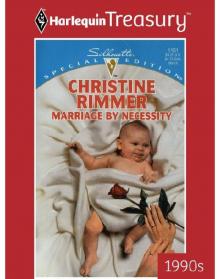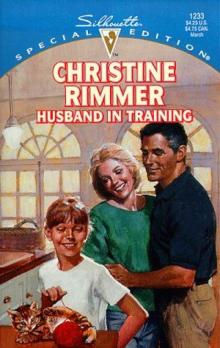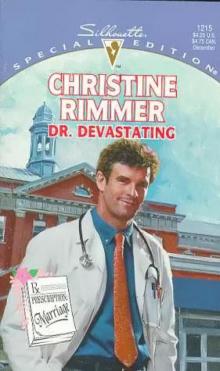- Home
- Christine Rimmer
DR. DEVASTATING Page 6
DR. DEVASTATING Read online
Page 6
"Yes."
"And since then, he has been hostile and very close to insulting toward you in your working relationship with him. No, he does not make sexual remarks, obscene gestures or physical advances. But he's mad because you told him no—and he's taking his anger out on you."
"Yes," Lee said. "That's it. That's it exactly."
"So confront him with it."
Lee set her own glass on the coffee table, drew up both of her legs and rested her chin on her knees. "I know you're right."
"Look. Do you want to go to Walter with this right now?"
"No. No, I think it's only fair to Der … er, Dr. Taylor, that I try to settle this between the two of us, if I can."
"Good. Then do it."
Lee wrapped her arms more tightly around her legs and studied her bare toes. "I have to admit, I keep hoping that maybe he'll just … stop treating me this way. That I'll wake up tomorrow and things will be the way they were before."
"Well." Dana spoke kindly. "Maybe they will."
"But you think it's doubtful, don't you?"
Dana ran a hand back through her sleek honey blond hair. "I'm making no predictions. You just come to me, if you can't work it out. And we will talk to Walter. All right?"
"Thank you," Lee said softly, and couldn't resist adding, "you're the greatest, you know? And you look so … happy. You and Katie both. I mean, it's true what they say. Love makes a woman glow."
Dana pretended to groan. "I can't stand all this gushy stuff. What's gotten into you?"
"You're going to be a beautiful bride."
"Which reminds me—your fitting is this Saturday."
Now Lee was the one groaning. "Right. My fitting. Bridesmaid's dress number—what? Twelve or thirteen, I do believe."
"Now you sound more like your old self. And you know, Katie and I have been talking. We've been thinking that maybe instead of that deep teal for you, we'll go with magenta. With that dark hair of yours, magenta would be striking."
"I've never been striking in my life, and I have no intention of starting now."
"Don't put yourself down. I hate it when you do that."
"Dana. Thanks for your help. Now go home to Trevor."
"You don't like magenta?"
"Whatever you and Katie want, I will love."
"We'll discuss it at length, on Saturday."
"Oh, I'm sure we will."
Dana leaned over and brushed Lee's bangs away from her eyes. "I mean it. If you can't work it out with Dr. Devastating, you let me know. Okay?"
"Dr. Devastating. Terry Brandt called him that just the other day."
"All the nurses call him that. And did you hear what I said?"
"Yes. But I still hope it doesn't come to that."
* * *
Chapter Five
« ^ »
At a little after ten the next morning, when Derek had barely been at work for an hour, Lee found him rifling the papers at her desk area of the nurses' station.
She asked him, with seriously strained courtesy, "Is there something I can help you find?"
He held up a chart she'd been checking against some of the information in the hospital's computer files. "This should be back in records by now."
"I was just checking—"
"I don't want to hear your excuses, Lee. I want you to do your job."
Paul Uhana, the L.P.N, who handled most of the clinic's phone triage, was sitting just a few feet away, on the phone as usual. Even with a patient describing symptoms in his ear, he couldn't miss the blatant censure in the doctor's tone. He glanced up long enough to send Lee a pitying look, and then cut his gaze away and spoke into the phone once more.
Lee drew herself up. "I think that remark was uncalled-for, Doctor."
Derek tossed the chart back on the counter. "Just get it back to records." And he turned and stalked away.
About a half an hour later, Paul caught her in the copy room. They were standing side by side as he poured himself some coffee and she heated water in the microwave for a mug of strawberry leaf tea.
"I never give advice," Paul said in that soft Jamaican lilt of his. "But I'm making an exception for you."
Paul rarely gossiped and always minded his own business. To Lee, that lent validity to whatever he might have to say. "I'm listening."
Paul leaned closer. "Dr. Taylor is a good man, I think."
The microwave beeped. Lee took out her mug and dropped in the tea bag. "All right. He's a good man."
"But he goes too far with you. We've all noticed. You ought to talk to him about it."
Lee found a stir stick and poked at the tea bag to submerge it fully. She was thinking of her conversation with Dana the night before. "I'm … working up to it." She tapped the stick on the edge of the cup.
The door opened then. It was Jack. "Paul. Patient for you on three."
"Coming." He gave Lee one last significant glance. "You should do it soon, I think. Very soon."
"I know," she said.
Alone in the copy room for a blessed few minutes, Lee sipped her tea and considered the suggestion both Paul and Dana had made.
That she talk to him. Get it out in the open. Make a real effort to get him to understand that the way he treated her was totally out of line.
Would talking to him work?
It hadn't before.
But she had been a little … placating then. That had been the very first morning after she turned him down. She'd hoped more to smooth things over than anything else at that point. Now, she had honest complaints to voice.
Would he listen?
Maybe.
She did believe that, beneath all that ego and arrogance, there beat the heart of an ethical man. She'd worked with him for six months, after all. They had different working styles. He might be your typical control-freak M.D., but he wasn't totally uncaring.
She had seen him hold the bell of his stethoscope in his hand, warming it before he put it against an asthmatic child's thin chest. He sometimes told little stories when he gave an injection—silly stories about cars or animals or whatever might interest the patient—to distract them from the quick, cruel pain of the needle going in.
Until recently, and in spite of the differences in their two approaches to patient care, she had liked him. And she had enjoyed working with him.
And maybe Paul and Dana were right. Maybe she was going to have to stop hoping that Derek Taylor would just wake up one morning and decide to get off her back.
She would have to take action. And soon.
Derek was thinking along the same lines. However, from his point of view, Lee was the one with the problem.
It drove him crazy, just to have to be around her. And it wasn't anything personal—no, not personal at all. He'd simply had it up to here with her sloppy work habits and her refusal to consider better ways to manage her time.
True, her work habits hadn't really bothered him all that much until just recently. He had felt more tolerant of them before.
Before what?
He chose not to think about that. He focused on her transgressions.
She left toys in the examining rooms. And she was always holding charts back from records to check on things that didn't require checking. Her work area needed straightening.
And she left herself sticky notes. Derek hated sticky notes. Little yellow squares of paper, looking sloppy, stuck everywhere from computer screens to the cabinets in the copy room. A few days before, he'd sat down in one of the chairs in the nurses's station, having failed to notice that a sticky note had fallen onto the seat. He'd walked around for an hour or so with the number of a local women's shelter stuck to the back of his lab coat.
Unacceptable. That was the word for Lee's work lately. Unacceptable.
He would have to have a serious talk with her. There was no way around it. And he would have to do it soon.
The final straw came that afternoon.
The waiting room was packed. Derek, Terry and Jack were
working their tails off trying to deal with the patient load. Sometimes, when they got seriously backed up, Paul would step in and help speed things along. But Paul was backed up, too. He sat at his phone in the nurses' station, taking one call after another.
Every examining room had a patient in it. And the patients in the waiting room were starting to complain.
And Lee had been closeted for half an hour in Room 2 with a woman who had come in for five minutes worth of suture removal. Every time Derek glanced at his watch, he grew angrier.
Lee was just going to have to get her priorities in order here.
Finally he'd had enough. He rapped on the door behind which Lee was busy wasting time.
After a minute, she stuck her head out.
He tried to compose his expression, tried to keep himself from scowling at her. "Lee. This is unacceptable. We have more than one patient to consider here and—"
She interrupted him in midsentence. "Is there an emergency?"
"Well, no. But—"
"Then I can't help you now."
He wondered at that moment if she understood the English language. "Did you hear what I said? We are running seriously behind and you will have to—"
"I'm sorry," she informed him, not sounding sorry at all. "I have a real crisis going on in here and I can't deal with you right now." With that, she shut the door in his face.
He stared at that door. At the big, white number 2 mounted on it at eye level. He wanted to kick the damn thing in. Just kick it in and get to her. Get his hands on her and—
"Doctor," Terry Brandt said, "I've run the diabetes stick and checked the vital signs on Mr. Ontkean in Room 5. He's ready for you now."
Derek closed his eyes. He sucked in a long breath. "Thank you, Terry."
He turned toward the room farther down the hall. Right then, the door to Room 2 opened. He spun back to it.
Lee emerged, an arm wrapped tight around the patient, who had her face buried in Lee's shoulder. The woman's child—Mary or something, Derek couldn't quite call up the name—sucked furiously on the thumb of one hand while, with the other hand, she clutched the hem of her mother's skirt.
"Mama cwy," the child said around her thumb.
Derek confronted Lee. "What the hell is going on?"
At the sound of his voice, the patient—Hirsch, yes, that was her name, Lenora Hirsch—gasped and cringed closer to Lee.
Lee said, so carefully, "She's very upset. And she doesn't need to hear harsh words from an angry man right now." She rubbed the woman's back. "Come on, Lenora. Let's go. It's not far, I promise you. I'll take you there."
"Take her where?"
"The women's shelter over on East Main."
Derek stared from the patient to Lee and back again. He did remember Lee's suspicions concerning that patient. Clearly the woman needed more than medical help. But he also had a waiting room full of patients—and Lee Murphy was one quarter of his staff.
"You're needed here."
She didn't waver. "I'll be back in half an hour. I promise you." She started to guide the woman and child up the hall toward the exit.
He stepped into her path. "It's half an hour we don't have, Lee."
The Hirsch woman let out a strangled, frightened sob. Lee held her closer. "I'm sorry. There's no putting this off. This is the moment when she's willing to act. And I consider it part of my job to see that the moment doesn't get by her. Now, would you please step out of my way?"
Derek knew he was beaten. Rage and frustration churning inside him, he moved aside.
"Thank you," Lee said tightly, then lowered her voice to a soothing whisper. "Come on now, Lenora. Let's go."
Derek spoke to Lee's retreating back, keeping his tone even and very controlled, "I want to see you in my office. Today, before the end of your shift."
"Fair enough." She tossed the words back over her shoulder as she led the Hirsch woman and her child away.
* * *
Chapter Six
« ^ »
At 6:20 that evening, when the last patient had finally been seen, Lee knocked on the door to Derek's office.
"Come in."
Lee closed her eyes, rested her forehead against the door and mouthed the word, "Courage." Then she straightened her shoulders and turned the door handle.
Derek sat behind his desk. He'd taken off his lab coat but had yet to put on his jacket. He was writing something on a yellow legal pad. Beneath the starched cuff of his pale blue shirt, his tanned hand moved swiftly across the pad. He glanced up.
"Lee," he said. Cool. Professional. Totally self-possessed. He pointed with his pen. "Have a seat."
Lee slid into the same consulting chair she'd taken the last time she'd been closeted in here with him, when she'd told him as diplomatically as she could that she just wanted to do her job and get along. As it turned out, diplomacy hadn't worked very well. Now she knew she must steel herself to employ stronger tactics.
He wrote a few more lines, gold head bent, a frown between those shining brows. Lee waited. He was the one who had called this meeting, after all. He could take charge of it, run it any way he wanted to—including letting her just sit there and squirm while he scribbled away.
Fine. She would sit. She would do her best not to squirm. As soon as he got around to it, he would have his say. And then she would have hers.
A few seconds later, he stopped writing. He looked at what he'd written, frowned some more and then shrugged. He set the pen and the legal pad to the side of his desk blotter, taking an extra few seconds to place the pen just so at the top of the pad and square the pad up with the edge of the blotter.
Finally he folded his hands on the blotter and faced her across the desk. "I think it's time we spoke frankly, Lee."
She realized her own hands were gripping the chair arms way too hard. She ordered them to relax and tried a polite smile. "I think you're probably right."
His frown deepened. "I don't see this situation as humorous in the least."
So much for politeness. She scowled right back at him. "Neither do I."
"Then why were you smiling?"
She decided not to answer that. He'd only said it to intimidate her anyway.
He looked down at his folded hands, then back up at her. "Lately I find it extremely difficult to work with you. And the incident this afternoon with the Hirsch woman was the final straw. You could see how backed up we were, yet still, you insisted on walking out on your job."
Lee longed to jump to her own defense. Already, her adrenal glands had kicked into gear, producing epinephrine, urging a fight-or-flight reaction. Her face felt hot with anger and her skin all prickly. Her heart pounded like an angry fist at the wall of her chest. Still, she clung to her original intention not to speak until he had said it all.
He continued, "You've been—how else can I say it?—nothing but a problem lately. You're constantly holding charts back from records. Your work area is untidy, papers everywhere, in no order that I can see. And worst of all, you simply refuse to manage your time effectively when you're with patients. If some aging hypochondriac wants to bend your ear for an hour over nothing in particular, you let him—no matter how many other patients are out there, waiting for their turn with you."
He fell silent, and just stared at her, as if daring her to speak. When she didn't, he picked up the pen that he'd set so neatly on the legal pad and turned it in his fingers, studying it, as if he'd just noticed something new about it that had escaped his notice up till now.
At last, he looked at her again, pinning her with that cruel blue stare. And then he tossed the pen down. "All right. What I'm getting at here is that your work has become unacceptable. And you're either going to have to start improving or—"
Lee did speak then. "Don't say it."
His broad shoulders stiffened. "Excuse me?"
"Don't tell me I should look for another job. Please."
He leaned back in the chair, a very deliberate kind of motion, and rested h
is elbows on the chair arms. "Why shouldn't I?"
"Because I'm not going to quit. And you can't fire me. I work for Honeygrove Memorial, not for you. You can place a formal complaint about me, but that's the most you can do."
He made a low, impatient sound. "I know that."
"Then don't suggest I go elsewhere. Because I won't. I love this job."
"You don't behave as if you do."
"That's an outright lie."
"No, it's—"
"A lie, Doctor," she said again. "And you know it is."
"I do not—"
"You do. You know. My work habits have not changed. I do things exactly the same way I always did."
"Of course you want to believe that."
"I believe it because it's true." She leaned forward in her chair, determined to get through to him. "Listen, if Lenora Hirsch had come in here on a busy Friday afternoon a few weeks ago, I would have done exactly what I did today. The difference is, a few weeks ago, you would have understood."
"No, I—"
She cut him off by repeating her own words more slowly, emphasizing each one. "You would have understood. Oh, you might have been irritated with me. You might have tried to talk me out of leaving—at first. But then you would have really looked at that woman. You would have seen how emotionally devastated she was. You would have admitted to yourself that her situation constituted an emergency and that she was clinging to me as her lifeline. You would have realized that my job right then was to take her to a place where she could get the help she needed."
He was shaking his head. "No, that's not so. This is a medical clinic. We are not in the business of involving ourselves in the personal lives of our patients."
"As much as we can, Doctor, we are in the business of saving lives."
"You want me to believe that your walking out of here with that woman today somehow saved her life?"
"Yes, that is exactly what I want you to believe. Because it's true. Her husband's been beating her for years. On more than one occasion, he has threatened to kill her. At some point in the near future, I have no doubt he would have succeeded. He has managed, over time, to break quite a few of her bones—not to mention all the lacerations and mild concussions he's inflicted. She's terrified of him. Over the years, she's seen five or six different doctors. At least one or two of them must have suspected the real problem. But you know how it is. Who has the time to look into the cause of all these 'accidents' she keeps having? It's easier just to treat the injuries and move her along."

 The Right Reason to Marry
The Right Reason to Marry Same Time, Next Christmas (The Bravos 0f Valentine Bay Book 3)
Same Time, Next Christmas (The Bravos 0f Valentine Bay Book 3) Home for the Baby's Sake
Home for the Baby's Sake In Search 0f The Long-Lost Maverick (Montana Mavericks: What Happened To Beatrix? Book 1)
In Search 0f The Long-Lost Maverick (Montana Mavericks: What Happened To Beatrix? Book 1) A Temporary Christmas Arrangement
A Temporary Christmas Arrangement Switched At Birth
Switched At Birth In Search of the Long-Lost Maverick
In Search of the Long-Lost Maverick From Here to Paternity
From Here to Paternity Almost a Bravo
Almost a Bravo Her Favorite Maverick
Her Favorite Maverick A Husband She Couldn't Forget
A Husband She Couldn't Forget In Bed with the Boss
In Bed with the Boss Bravo Christmas Reunion
Bravo Christmas Reunion The Maverick Fakes a Bride!
The Maverick Fakes a Bride! The Tycoon's Instant Daughter
The Tycoon's Instant Daughter The Bravo Bachelor
The Bravo Bachelor 37 Her Highness and the Bodyguard
37 Her Highness and the Bodyguard A Bravo for Christmas
A Bravo for Christmas THE BRAVO BILLIONAIRE
THE BRAVO BILLIONAIRE The Rancher's Christmas Princess
The Rancher's Christmas Princess No Less Than a Lifetime
No Less Than a Lifetime A Bravo Christmas Reunion
A Bravo Christmas Reunion Marooned with the Maverick
Marooned with the Maverick Their Secret Summer Family (The Bravos 0f Valentine Bay Book 7)
Their Secret Summer Family (The Bravos 0f Valentine Bay Book 7) Carter Bravo's Christmas Bride
Carter Bravo's Christmas Bride Stroke of Fortune
Stroke of Fortune THE MILLIONAIRE SHE MARRIED
THE MILLIONAIRE SHE MARRIED Marriage, Bravo Style!
Marriage, Bravo Style! Marriage By Necessity
Marriage By Necessity Marrying Molly
Marrying Molly Married in Haste
Married in Haste A DOCTOR'S VOW
A DOCTOR'S VOW Bravo Unwrapped
Bravo Unwrapped![A Maverick to [Re]Marry Read online](http://i1.bookreadfree.com/i/03/24/a_maverick_to_remarry_preview.jpg) A Maverick to [Re]Marry
A Maverick to [Re]Marry Born Innocent
Born Innocent The Bravo Family Way
The Bravo Family Way The Reluctant Princess
The Reluctant Princess Husband in Training
Husband in Training HOLIDAY ROYALE
HOLIDAY ROYALE James Bravo's Shotgun Bride
James Bravo's Shotgun Bride The Maverick's Accidental Bride (Montana Mavericks: What Happened At The Wedding Book 1) (Contemporary Cowboy Romance)
The Maverick's Accidental Bride (Montana Mavericks: What Happened At The Wedding Book 1) (Contemporary Cowboy Romance) The Stranger and Tessa Jones
The Stranger and Tessa Jones Practically Married
Practically Married The Good Girl's Second Chance (The Bravos Of Justice Creek 2)
The Good Girl's Second Chance (The Bravos Of Justice Creek 2) Married by Accident
Married by Accident Christine Rimmer - A Hero for Sophie Jones
Christine Rimmer - A Hero for Sophie Jones A Bravo Homecoming
A Bravo Homecoming Wife Wanted
Wife Wanted Harlequin Special Edition July 2013 - Bundle 1 of 2: Marooned with the MaverickHer McKnight in Shining ArmorCelebration's Bride
Harlequin Special Edition July 2013 - Bundle 1 of 2: Marooned with the MaverickHer McKnight in Shining ArmorCelebration's Bride Her Favorite Maverick (Montana Mavericks: Six Brides For Six Brother Book 1)
Her Favorite Maverick (Montana Mavericks: Six Brides For Six Brother Book 1) A HOME FOR THE HUNTER
A HOME FOR THE HUNTER![A Maverick to [Re] Marry Read online](http://i1.bookreadfree.com/i1/04/03/a_maverick_to_re_marry_preview.jpg) A Maverick to [Re] Marry
A Maverick to [Re] Marry Lori’s Little Secret
Lori’s Little Secret Stranded with the Groom
Stranded with the Groom Sunshine and the Shadowmaster
Sunshine and the Shadowmaster The Last Single Maverick
The Last Single Maverick The Nine-Month Marriage
The Nine-Month Marriage Fifty Ways to Say I’m Pregnant
Fifty Ways to Say I’m Pregnant Ms. Bravo and the Boss
Ms. Bravo and the Boss The Marriage Conspiracy
The Marriage Conspiracy Prince and...Future Dad
Prince and...Future Dad Not Quite Married
Not Quite Married The Reluctant Cinderella
The Reluctant Cinderella Their Child?
Their Child? Marriage, Maverick Style!
Marriage, Maverick Style! Donovan's Child
Donovan's Child A Bride for Jericho Bravo
A Bride for Jericho Bravo THE M.D. SHE HAD TO MARRY
THE M.D. SHE HAD TO MARRY DR. DEVASTATING
DR. DEVASTATING MAN OF THE MOUNTAIN
MAN OF THE MOUNTAIN The Prince's Cinderella Bride
The Prince's Cinderella Bride Rachel's Bundle of Joy
Rachel's Bundle of Joy HOW TO MARRY A PRINCESS
HOW TO MARRY A PRINCESS Prince and Future... Dad?
Prince and Future... Dad? The Prince She Had to Marry
The Prince She Had to Marry Resisting Mr. Tall, Dark & Texan
Resisting Mr. Tall, Dark & Texan The Taming of Billy Jones
The Taming of Billy Jones McFarlane's Perfect Bride
McFarlane's Perfect Bride The Lawman's Convenient Bride
The Lawman's Convenient Bride The Man, The Moon And The Marriage Vow
The Man, The Moon And The Marriage Vow A Bravo Christmas Wedding
A Bravo Christmas Wedding Scrooge and the Single Girl
Scrooge and the Single Girl Harlequin Special Edition October 2015, Box Set 1 of 2
Harlequin Special Edition October 2015, Box Set 1 of 2 The Marriage Medallion
The Marriage Medallion Cinderella's Big Sky Groom
Cinderella's Big Sky Groom 33 The Return of Bowie Bravo
33 The Return of Bowie Bravo The Prince's Secret Baby
The Prince's Secret Baby WAGERED WOMAN
WAGERED WOMAN